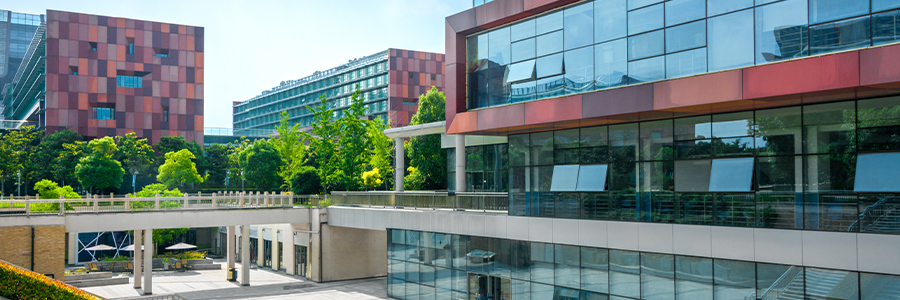
As environmental awareness and climate concerns grow, maintaining a sustainable company image has never been more critical. Landscaping plays a key role in shaping that image. Sustainable commercial landscaping and maintenance practices not only support environmental health but also enhance a company’s reputation and brand identity. However, true sustainability in landscaping is impossible without efficient irrigation. Inefficient irrigation wastes valuable water resources. The challenge lies in effectively watering and maintaining a commercial landscape to keep it visually appealing without over-saturating, which leads to wasted water and higher costs.
More than ever, commercial companies are reducing water costs and wasteful runoff with smart irrigation technology, and sustainable landscaping practices and products that are proven to be cost-neutral, when compared to water cost savings.
Sustainable commercial landscaping is typically designed and maintained with the following in mind:
- Native and drought resistant plantings that are adapted to a local climate have evolved to survive droughts and require little to no water. Planting a landscape with these hardy specimens instead of non-native, non-renewable plants will most definitely conserve precious water.
- Use of rocks, gravel and pebbles in landscape design allows rainwater to filter down into the soil instead of running off into storm drains, an important part of water conservation.
- Smart irrigation sensors and controllers can determine precisely how much water is needed in the root system deep beneath the ground surface. Rain sensors will know not to water when it rains, preventing unhealthy oversaturation and wasteful runoff.
Today’s smart irrigation technology reduces water usage and waste, so is highly cost effective. It utilizes cloud-based real-time weather data, and site-specific conditions to keep plants hydrated and healthy, as opposed to traditional, manually programmed irrigation that can oversaturate soil and result in costly runoff.
When it comes to cutting-edge smart irrigation technology, HydroPoint has been the industry leader, consistently named a Top Smart Water Management Solution Provider for delivering healthy landscapes, reducing wasteful runoff, and dramatically reducing a company’s water costs. Its proven smart water irrigation technology is widely recognized in the industry for changing the way companies are using water, and the positive impact it is having on the environment through sustainable landscaping practices.
“It’s remarkable to see both corporations and municipalities embracing the economic and environmental benefits of onsite smart water management,” said Chris Spain, CEO and Co-founder of HydroPoint. “Our passion is getting rid of systematic onsite water waste which hurts both the bottom line, local community, and planet at large.”
By adopting smart irrigation technology and sustainable landscaping practices, businesses can make a significant impact—both environmentally and economically. Efficient water management not only helps conserve one of our planet’s most vital resources but also reduces costs, enhances a company’s image, and supports long-term sustainability goals. With proven solutions like HydroPoint’s smart water management technology, companies can lead the way in creating beautiful, eco-friendly landscapes that align with modern climate-conscious values. Now is the time to take action and invest in sustainable landscaping solutions that benefit your business, your community, and the environment.

Blog: Goodbye Non-functional Turf, Hello Sustainable Landscaping
Transitioning from non-functional turf to sustainable landscaping with native, drought-resistant plants can significantly conserve water and enhance environmental resilience.

HydroPoint Named a Top Smart Water Management Solution Provider
HydroPoint earns top recognition for revolutionizing water management with smart solutions, eliminating waste ‘one drop at a time.’

Smart Water Management Helps Leading Retail Company Achieve ESG and Sustainability Goals
Discover how a leading retail company met its ESG sustainability goals by implementing smart water management strategies, resulting in significant water savings and improved efficiency.

